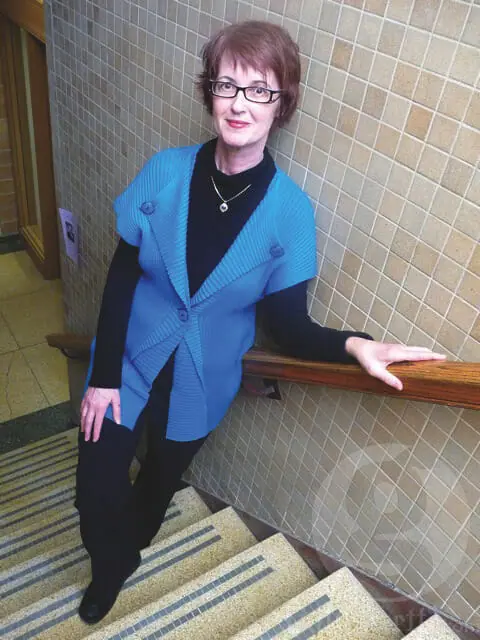“I’ve been crying a lot this week.”
Jane’s words echo in the empty room. It has been one week to the day since the 23-year-old Dalhousie master’s student was sexually assaulted at a bar in Halifax.
She’s still in shock. Her determination to get a story in the paper about how and why this happened to her is astounding.
“I still feel ashamed,” she says. “It’s just been kind of a struggle this week to fight those feelings back.”
The shock of being sexually assaulted was followed by an onslaught of emotions—mostly, she says, self-blame.
It didn’t help that the bar staff that night told her it was nothing more than a drunken mistake.
“It happens to everyone,” they had said. “Don’t worry about it; we’ve all been there.”
‘Have you?’ wondered Jane. That thought worried her. The staff went on to tell her that if she were to attempt to go after this man, to prosecute, she could ruin his life.
“Besides,” they said, “nothing would come of it. What’s the point?”
Because of that conversation in the bar, Jane decided not to call the police. After all, what would be the point?
And that’s really where this story, like so many others, begins. Eighty-eight per cent of sexual assaults in Canada do not get reported to police, according to Census data from 2006. Ninety per cent of sexual assault victims did not seek support from the criminal justice system at all.
According to Don Spicer, the public safety officer of the Halifax Regional Police, sexual assaults are by far the most unreported crime.
“We can’t really address an issue unless we know it is an issue,” says Spicer. “I mean, we know sexual assaults are an issue but … well, there are any number of reasons why people don’t feel comfortable coming forward with something like that.”
He says it is the Provincial Department of Justice that regulates bar staff and determines what type of training they require. “Any type of training we can get that is going to make someone more comfortable coming forward, the better it will get.”
Unfortunately, bars are part of an industry where there is currently no legislation that requires owners to train their security to handle sexual assaults, despite so many occurring in bars.
For Jane, it all happened in a bar.
It started with dancing.
Then kissing.
Then he asked her to accompany him downstairs.
Then he took her behind a curtain and the asking stopped. Her pants were down.
“It wasn’t even like there had been any touching in between,” says Jane. “There was no lead up.”
Then he was forcing himself on her. He asked if he could take off his condom— it was the only time he asked for her consent on anything. She said no. Then, he stopped.
She never gave consent. Regardless, the fact that she was drunk made it impossible for her to give consent.
When her friends found her in the bar later that night she was speaking in a disembodied voice, asking for her coat again and again.
Her friends all thought she should report the man to the bar staff. After all, they probably deal with this kind of thing all the time, they said.
And in fact, that’s exactly what the staff told her: “Don’t worry about it,” they said, “this kind of thing happens all the time.”
At that point, she says, all she cared about was leaving. She couldn’t bear the thought of explaining her story again to yet another victim-blaming person, cop or not.
And one more assault goes unreported.
“I am still experiencing a lot of self-blame. There are some moments where I think, ‘How could I let something like this happen to me?’ And I’m like, ‘Oh, maybe if I didn’t drink that much or if I didn’t go off?’
“And what if I hadn’t gone behind the curtain?”
Gaye Wishart is an advisor on harassment prevention in the Human Rights, Equity & Harassment Prevention office at Dal. She also chairs the board at the Avalon Sexual Assault Centre, the only full-time sexual assault centre in Nova Scotia.
“What we’re seeing is a lot of people coming years later, seeking help. They try to deal with it themselves in the first instance thinking that this isn’t going to have the impact that they later realize that it has.”
She says the biggest issue is victim-blaming.
“When you’ve been assaulted, people are emotional. Or maybe they are in shock and they aren’t emotional and that also leads to some people making value judgments about ‘was that person assaulted or not.’”
She says it’s important to know that whether or not a victim of sexual assault decides to file a formal complaint, there are options available.
At Dal, victims of sexual assault can seek out a No Contact Order against the assaulter or arrange to change their class schedules to avoid them. The centre can also provide a community liaison officer who will accompany the victim if they want to speak to police.
At the Avalon Sexual Assault centre, there are specialized counselors who are trained to deal with sexual assault. It’s a place to go for anyone who just needs to talk about what happened.
As a university city with the second highest bars-per-capita ratio in Canada, and where the buses stop running at midnight, the prevalence of sexual assault is just another sad reality.
Gary Muise, VP of Operations for The Grafton Connor Group, which owns Cheers Bar and Grill, The Dome and Taboo Nightclub, refused to comment on whether they train their staff to deal with cases of assault. The bar in question also refused to comment.
The majority of security for the bars and clubs in the downtown area are trained in-house by staff to phone police in case of emergency.
The Halifax Regional Police forces have specialized units trained in sexual assault investigations. But when police are not called, or in the time it takes for them to arrive, the bar staff act as first responders.
A few bars in the downtown area have taken the initiative to provide training to their staff, though.
Source Security provides security for The Grawood, The Fireside and The Bitter End. They run a mandatory course on guard training that includes sexual assault and sensitivity training. It’s considered standard, along with violence intervention, ID-spotting and liquor laws, says Geoff Flemming, the director of business development.
Dan Harrison is the communications advisor in the provincial Department of Justice. Since bar security was recently included under the definition of security, they are now required to meet certain regulations.
Under the Private Investigators and Private Guards Act, expected to be in force in May, bars may be regulated to provide staff with specialized training. But whether sexual assault training is included in this regulation is yet to be determined.
“We saw that there was a deficiency in security,” says Harrison. He says this could be the first time sexual assault training becomes mandatory for bar staff.
For Jane, the reactions of others have made her question her own experience.
“I think for me, I had to try and figure out in my own mind what consent was and to realize that I don’t know,” she says.
“A few people have referred to what happened to me as ‘rape,’ but I am still having a hard time figuring that out.”
She mutters something about sexual coercion under her breath. All of the conflicting terms she has been introduced to in the span of a week are enough to overwhelm.
“I can’t tell my mom. The idea of telling my mom this is just too hard,” she says.
“The thing is, I don’t even feel angry right now. I just feel really sad.”
Editor’s Note: The name Jane in this story is a pseudonym. The real name has been changed in order to protect the well-being of the source.



Recent Comments